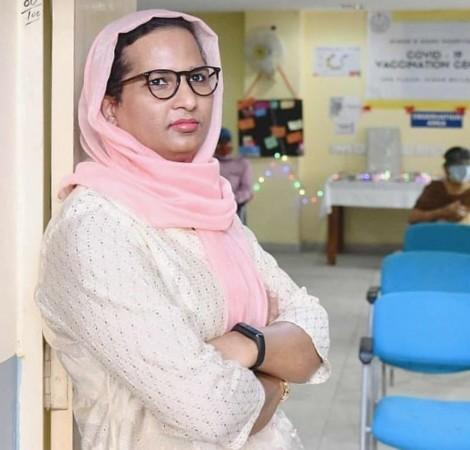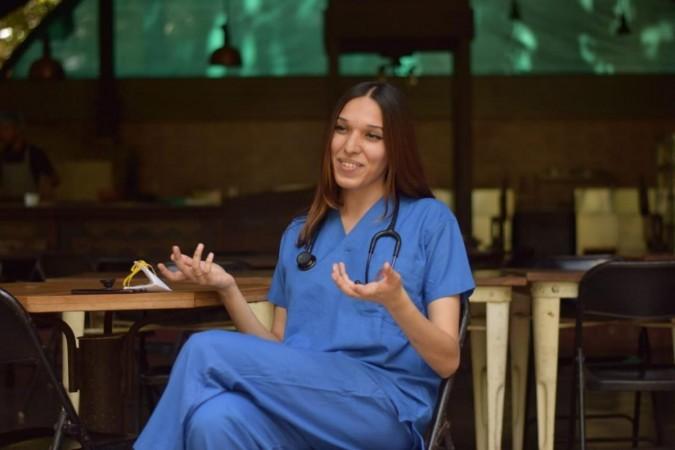In a country of more than 130 crore people, 12.5 lakh doctors, and 3.71 lakh specialists, a small and rising community of transgender doctors is energetically trying to make sense of the existing healthcare system, which understands and accepts trans people in the pathological sense but still has no sturdy place for them in its studies, dialogues and social construct.
Dr. Aqsa Shaikh from Delhi is one who has managed to trudge the long route of societal limitations and claimed her space in the field of medicine. However, pride and prejudice are a constant battlefield.
Talking to IBTimes about the growing representation of trans persons in the field, she shares, "We still don't have enough representation in the medical fraternity. If we include medical graduates and students, there are about 10-20 of us. If we include people from other healthcare professions, then it may go up to 100. In a country of 130 crore population, it's a very tiny number to bring about change. And therefore, in spite of trans persons being there in the medical field, we need allies."
Sharing her views on how supportive the fraternity is, she said: "People from within the medical community have some understanding of gender identities and queer issues but often this understanding is very medicalized, on a very scientific basis than a social construct. And that can help them understand this as a pathology or as a disease but not as a normal part of society. But still, I'd say they are better than those who are from the other fields."

Dr. Trinetra Haldar Gummaraju from Karnataka feels there is a need to be cautiously optimistic in this long journey of true inclusion and diversity.
"While several trans doctors have made their way into a cisgender-heterosexual-dominant medical fraternity, we have a very long way to go before true inclusion and diversity. Most trans doctors I know including myself have experienced negative attitudes, stigma, prejudice within healthcare both in syllabi and in training. Even for a trans doctor to exist is news-worthy. That said, things are changing slowly, and in my opinion, one must be cautiously optimistic."
The doctor-patient relationship
While the relationship of a doctor and a patient needs to be of utmost trust while the latter puts his/her life in the hands of the former, there is still a certain gender identity that a patient expects its healthcare practitioner to associate with.
"Patients do not discriminate against their doctors; it is sometimes the trans patients that face discrimination from their doctors. With the increase in online conversations and virtual interactions, we do often get comments such as 'we don't even know your gender, whether you are a man or a woman, how can we take your advice seriously?'" shares Dr. Aqsa while adding that although these comments hurt sometimes, most remarks and comments are very encouraging and that helps.
Dr. Trinetra, who works as an intern with KMC Manipal currently, feels that society has a very rigid understanding of what a "respectable" doctor must look and behave like.

"Most patients who come from rural Karnataka don't have access to education and literacy, let alone gender and sexuality literacy. This becomes a major source of dysphoria, given that a hospital often expects doctors to adhere to strict gender norms—society has a very rigid understanding of what a "respectable" doctor must look and behave like, lest you be exposed to rising violence against doctors. On a day-to-day basis, I make sure to interact with patients as amicably and empathetically as possible, and that ensures no trouble. While I've noticed discomfort amongst patients at the start of my transition, I don't see it anymore," she states.
What is Trans Care?
Sangath, a public health research NGO based in Bhopal has introduced a program called Trans Care India for they feel that trans persons are mostly 'unseen' in our healthcare system.
Harikeerthan, a medical graduate from CMC Vellore, did his Masters in Health and Development from LSE, and in between worked a few years with National Health Mission in Chennai. "I was looking at how to make our mental health policy LGBT inclusive. During this time, I realized that trans persons weren't even discussed as part of clinics or seen in hospitals. It was a steep learning curve and I realized there was a need for health equity in our country, he says.
Trans Care India currently has two ongoing projects, one is Trans Care Covid-19 and the other is Trans Care Med-ed. And through a series of workshops, discourse, and discussions with stakeholders and medical experts, educators from the field, the NGO wishes to bring about change in the current medical curriculum, making it more inclusive and accepting of the LGBT.















